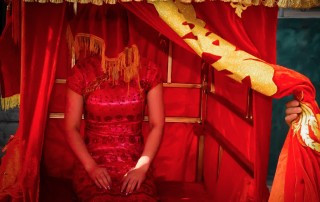The Marriage Market in Shanghai
Meet Market with Chinese Characteristics
A mention of the Shanghai People’s Park marriage market, known in Chinese as the Rénmín Gōngyuán Xiāngqīn Jiǎo 人民公园相亲角, is likely to elicit more than a few raised eyebrows from foreign visitors. After all, amidst all the international brands and skyscrapers, the whole idea seems rather anachronistic. In fact, it’s only one (albeit perhaps the most well known) of many similar “markets” that can be found in cities across China. In an age of online dating and “hookup culture”, they serve as a powerful reminder that while China may be hurtling towards the future, old habits die hard.
A match made in heaven, or…
While the marriage market certainly seems like something from another era, it is, in fact, a relatively recent response to changing demographics and social conditions, having started in the early 2000s. People’s Park (then as now) was a popular spot for older and middle-aged Chinese to gather to do group dancing, martial arts, taichi and calisthenics. After complaining about their single children’s inability to find a suitable match, they decided to take matters into their own hands and the marriage market was born.

Well, what is it then?
The primary goal of attending the wedding market is for parents to find a suitable partner for their child. Continuing the family lineage is very important in Chinese culture, and is closely linked with Confucian ideas of filial piety (xiàoshùn 孝顺). Traditionally, Chinese families left nothing to chance and arranged their children’s marriages themselves. Modern ideas of love had little relevance, as marriage was more about solidifying or advancing the social (or sometimes financial or political) status of the family. As such the institution of xiāngqīn 相亲 developed, during which the prospective couple would meet (chaperoned by family members, of course) to size each other up. Think part blind date, part job interview, with your bossiest relatives doing most of the talking for you.
Since the late 1970s, however, the rapid development of a market economy and attendant urbanization have conspired to disrupt these traditional practices. As has happened in other countries, the average age of marriage has slowly risen in China along with levels of education and income. Those born after 1980 marry later and less frequently than previous generations, due in part to the high cost of marriage ceremonies and the need to secure a house in China’s red-hot property market (one of the many prerequisites for a successful marriage in China). But while Chinese millennials maybe focusing more on their careers than pairing up, this has done little to change attitudes among their parents’ generation. The one-child policy has raised the stakes even further, leaving many parents determined to find a good match for their one and only child.
Who participates, and why?
The first thing many visitors notice is the lack of people of marriageable age at the market. Indeed the “goods” being advertised are rarely present themselves at the market, which is largely a place for parents of unmarried children to trade information in the hope of finding a match for their child. For the post-80s generation, it is often considered embarrassing to be advertised at marriage markets. As such, parents usually attend without their children’s permission.

How does it work?
The advertisements tend to be straightforward and read something like a “marriage resume”:
- Age, height, and might even weight. It’s all laid out there, and while appearance is important, it’s not the deciding factor. However, many parents tend to have specific height requirements for their ideal son/daughter in law (to ensure tall grandchildren)
- Position, degree, current job, and in typical Chinese fashion, their income. Here’s where it’s all decided. What can your child offer a potential spouse? Housing is expensive in Shanghai! Does he/she have a car? How much does he make a month? We have bills to pay, and future children to feed. School is expensive too.
- Origin, and your date of birth. The first question the parents will ask if the person is Shanghainese or not. If one has a local hùkou 户口(housing registration) it will make it much easier to get access to education and healthcare.
Does it help?
The reality is that it rarely does. Few real matches are made, in no small part due to many children not wanting to marry someone because their parents found a one-page ad taped to an umbrella. But of course, finding an actual marriage is perhaps not the real point. It has a strong social component, with many parents striking up conversations with complete strangers over their children. In some sense, it’s just a place for parents to do what parents all around the world love doing: talk about their kids.
A Unique Attraction
Views on marriage are rapidly changing in China, along with the way young people view their own lives and their place in society. Many young Chinese people see themselves as trapped in between generations, wanting to pursue life and their own aspirations while also feeling pressure to live up to their parents’ expectations.
If you’re ever in Shanghai on a Saturday, the wedding market is a perfect way to see a different side of Chinese culture and can give you a unique insight into how marriage works, and how it used to work, in China. Who knows, you might even end up meeting your soul mate!
Interested in learning more about Chinese culture? See our article on dating apps in China, or…
Are you already packed and ready for a new adventure? Get in touch with our program consultants and start the process. Apply for free, and start asking questions. Get started now!